- Home
- Seanan McGuire
Laughter at the Academy Page 9
Laughter at the Academy Read online
Page 9
Her own smile faded. “One moment, please,” she said, and slid off her chair, vanishing into the back of the embassy.
“That wasn’t nice, Dot,” said Jack.
“Nope,” I agreed. “It wasn’t.”
Rinn didn’t say anything. I couldn’t tell whether that meant he was getting used to me, or had simply been horrified into silence.
The receptionist returned only a few minutes later, with the round, blue-clad form of Boq, Ambassador of the Munchkin Country and head of the anti-crossover political faction—not to mention one of my first friends in Oz, back before everything changed—following close behind her. “Dorothy!” he bellowed, in a tone that implied absolute delight at my presence. “You should have sent a card. I would have met you at the door with cakes and lemonade.”
“I didn’t really have the opportunity, Ambassador Boq,” I said, with a polite bow. “We’ve come on business for Ozma. May we retire to your chambers?”
Boq was a consummate politician, but even he couldn’t have faked the look of surprise on his face. It had been a long, long time since I went anywhere on business for Ozma. “Yes, absolutely, my dear. You and your friends, follow me.”
“Thanks.” I offered the receptionist a little wave as we followed Boq down the hall to his private chambers, which were larger than my entire apartment and appointed ten times as well. They still weren’t as nice as the quarters I’d shared with Ozma at the palace.
I waited until Boq was settled behind his desk, giving him a few moments to feel like I’d been stunned into silence by the opulence of my surroundings. Then, without preamble, I said, “A Munchkin man was found dead in the old Wizard’s Square today. He was dressed in Quadling colors. It’s pretty clear that we weren’t expected to figure out where he was from. Do you have any idea who he might have been? Ozma has tasked me to find his killers.”
Boq’s face twisted into a mask of revulsion. “You’ve come here to talk about Downtown, with me? Dorothy. I thought better of you.”
“No, Boq, I came here to talk to you about a murder. A Munchkin is dead. Surely that’s more important than your hatred of the crossovers.”
“Spoken like a girl without a country to defend,” he spat. “You deserted your precious Kansas for us. How long before you desert us for something better? It was only a matter of time before the crossovers began killing.”
“The fact that they had access to Quadling clothes and knew to re-dress him, that doesn’t concern you at all?”
“Crossovers are as cunning as Winged Monkeys, and as trustworthy,” Boq countered. “Really, you started killing the day you arrived. No wonder you speak for the rest of them. You’re the first murderess of the lot.”
“Since it got me a crown and made me a witch, I guess murder is pretty lucrative,” I said. “You’re the only one who might tell us who the man was, Boq. And you’re the one who stands to benefit most from an Ozite dying Downtown. That makes me wonder why you’re so defensive. I might just have to tell Ozma about this.”
“You can’t threaten me with Ozma,” said Boq. “She heeds my counsel now, not yours.”
“She heeds whatever counsel keeps Oz safest,” I corrected gently. “Who was he, Boq? You know every Munchkin in the City of Emeralds. Who’s missing?”
Boq hesitated. Then he sighed, and said, “Taf. He’s a junior clerk here at the Embassy. He didn’t report for work this morning.”
“Why didn’t you tell the guards?” asked Rinn. “We would have helped you find him.”
“Munchkins police their own.” Boq looked at me coolly. “We don’t depend on outsiders to fix our problems.”
“Funny,” I said. “I seem to remember an outsider taking care of your little ‘witch’ issue a few years back.”
Boq reddened, but he didn’t look away.
“Thanks for letting us know who he was,” I said. “You can probably collect his remains from the morgue later today.”
“Dust is a scourge,” he said. “I blame you and your kind.”
“Yeah, I know,” I said, and turned to go. Jack and Rinn followed me.
We were almost to the receptionist’s desk when I froze, my earrings chiming madly with the sudden motion.
“I’m an idiot,” I said.
“What?” said Jack.
“I never told him it was Dust.” I turned, running back to Boq’s office.
He was in the process of emptying his desk when I burst in—with Jack, Rinn, and the shouting receptionist all close behind me. I didn’t hesitate before launching myself across the room, grabbing Boq by the shoulders and pulling him away from what he’d been doing before he could destroy any more evidence. He shouted and threw a sachet of fine gray powder in my face, where it burst and filled the air around me in a choking cloud. I coughed and grabbed for him again. He shied away, stumbling right into Jack’s arms. Jack grabbed him and held fast. The pumpkin-head might be made of sticks, but he was stronger than a normal man. Magic can be funny that way.
Boq struggled against Jack’s grip for a moment before spitting in my direction and saying, “At least I get to see you die, crossover.”
“Uh-huh.” I coughed again before wiping the Dust out of my eyes. I was going to need another shower. “Funny thing, Boq. Crossovers can gather this stuff because they’re resistant. Crossing the shifting sands makes the Desert a little less potent for them. I’ve crossed the shifting sands more times than anyone.”
His eyes widened. Then he sagged, going limp in Jack’s arms. “You bitch.”
“It’s pronounced ‘witch,’ but that was a good try.” I turned to Rinn. He was keeping his distance from me. Smart boy. At this point, I probably qualified as a walking intoxicant. “Take him to Ozma. Tell her his clerk overdosed and Boq staged the murder to implicate the crossovers. Also tell her he tried to kill me.” I couldn’t keep myself from smiling. Ozma and I might not get along, but I was still her property as far as she was concerned, to coddle or break at her whim and no one else’s. She wouldn’t take kindly to hearing that Boq had given me a face full of Dust.
Boq knew that too. He whimpered, and kept whimpering as Rinn handcuffed him and pulled him from Jack’s arms.
I coughed again. The room was starting to spin. My multiple crossings of the Deadly Desert made me resistant, not immune. Jack’s arms caught me before I could hit the carpet, and I let him bear me up and carry me home.
When I woke up, it was raining, and the whole room smelled like petrichor. My head was still spinning, and so I closed my eyes again, waiting for the world to be still.
“Ozma sends her thanks,” said a voice from beside me—female, alto, and more welcome than a thousand roads of yellow brick. “She says that Boq will be dealt with appropriately.”
“Meaning he’ll be out in less than a week.”
“He’d have been out in less than a day if he hadn’t thrown that Dust in your face.” Polychrome’s hand touched my forehead. Her skin was cool and faintly damp, like a fine mist. “How are you feeling?”
“Better now.” I reached up to catch her wrist without opening my eyes. “How long has it been raining?”
“About eight hours. You’ve been asleep for ten. We should tell Jack you’re awake—”
“In a minute.” Oz was a land divided; the City of Emeralds was only the visual representation of a split that would tear us all apart, if we weren’t careful. Boq was my enemy now, if he hadn’t been already, and I was deeply afraid that if I started looking for the source of the Dust, all roads would lead me back to the Munchkin Country. Ozma was starting to use me again.
And none of that mattered as I opened my eyes and looked up into the face of the woman I loved, wide-eyed and worried and haloed by the rainbow-streaked cloud of her hair. I leaned up as she leaned down, and her kiss was like the end of a year-long drought. Outside, the rain came down, and oh, the sweetness of that storm.
I was so glad to be home again.
Homecoming
This stor
y was originally written for an anthology of football stories which never came to pass. It found a home at Lightspeed Magazine with John Joseph Adams, who has been a delightful constant in my short fiction career.
As I am not a football fan (American or European), writing this was a fascinating exercise into channeling a culture not my own. I am a big fan of cheerleaders, as anyone familiar with my Fighting Pumpkins stories will probably have noticed. On the whole, I am so very glad I wrote this story. It’s always wonderful to open a window onto something new.
Everyone remembers the Valkyries. Most people forget that Valhalla wasn’t the only option. And what is cheerleading, after all, if not a modern way of dancing through the battlefield?
The locker room is always tense before a game. Alisa is trying to get her uniform to stay in place, counting more on safety pins and prayer than she should, and Birdie—true to her name—keeps whistling, which is probably going to get her slapped if she doesn’t stop soon. Cram twenty girls from opposing squads into one small space and tensions are going to flare.
“Has anybody seen my nail file?”
“Where’s my hair tie?”
“Birdie, shut up.”
The October air smells like bonfires and promises, and it’s always October for this game, for the big game. October is Homecoming season. This is when promises are made and pledges are broken, and the boys of fall walk proudly into legend with their short-skirted heralds singing their praises every step of the way. The girls of fall, too, when they choose to take the field.
“Does this top make my breasts look big?”
“Did somebody take my blue mascara?”
“Birdie, shut up.”
There are locker rooms for the football players, of course: empty, echoing gray rooms lined with lockers and the memories of hot October nights that have no end. The world makes the mistake of thinking that every night happens only once, but no two people live through the same hour, the same evening, the same season. Every trial and triumph is unique, even when it’s shared—maybe especially when it’s shared, because then there are other mirrors for the moment to reflect against. Every night is infinite.
“How are my tights?”
“Tilly, will you come braid my hair?”
“Shut up, Birdie!”
Bit by bit, the preparations are completed: faces are painted, hair is styled, and squad divisions become clear as crystal, written proudly across the front of uniforms and detailed in the color of fabrics, cosmetics, ribbons tied to ponytails or braids. The Falcons, in blue and gold, and the Ravens, in red and rust. There is the much-scolded Birdie in Falcon blue, with gold glitter clinging to her cheeks like stardust. There is Alisa in Raven red, wearing a skirt that should have been retired two seasons ago. They line up like warriors preparing to take the battlefield, each facing another across the locker room. Bit by bit, the chatter and arguments die. Even Birdie’s whistle comes to a temporary end.
The team captains step forward, Elle in blue, Rona in red. Elle is the first to hold out her hand. Rona hesitates, takes it, shakes.
“Let’s have a good clean game tonight,” says Elle. “There’s no home team advantage.”
“That’s because every team is the home team here,” says Rona, and smiles, dropping Elle’s hand as she turns to her squad. “Gimme an ‘R’!”
“R!” scream the Ravens, and the Falcons are doing the same with their own name, and the locker room devolves into an almost primal storm of shrieking female voices. This, too, is part of the ritual; this, too, is the herald of the endless October night.
The game is about to begin.
There is no sign of primal fury in the twenty girls who slip from onto the darkened gridiron. They walk with calm precision, ten and ten, taking their places in front of the empty stands. Elle raises her hands, looking to Rona across the empty field. Rona mirrors the gesture. The captains nod in brief unison. Two sets of hands are clapped, and the age-old cry to battle echoes through the night:
“Ready? Let’s go!”
The stadium lights flash dazzlingly on, and the sound of thunder is close behind as the crowds—who were not there a moment ago, who have always been there, who will always be there when the October lights are lit—leap to their feet, stomping and clapping and howling for the boys of fall, the heroes of the night. Here they come now, twenty-two players in blank white uniforms pouring out of the locker room doors and onto the green, the sacred, moonlit green. They pump their fists in the air, and the cheerleaders are shouting encouragement, and vendors are selling popcorn in the stands, and oh, this is the night. This is the time they have been waiting for since they were born.
This is the night when they are heroes.
It doesn’t seem to matter that none of them are in team colors, because they fall into position all the same, without jockeying or argument. The crowd settles, and the cheerleaders lower their pom-poms, falling back to the flats of their feet as they wait for the game to begin. There is no need for a coin toss, customary as it would have been: the teams have not yet been truly decided.
The whistle blows to signal start of play. Here’s the snap, the quarterback drops back to pass, and he connects! The ball flies straight and true to the tight end in a throw that would be the stuff of high school legend on another field, on another night, in the arms of another October. The tight end turns, and he runs as hard as he can for the goal, clutching the ball in his arms like a promise. The people in the stands are screaming their heads off, and it’s all about the game, it’s all about the moment, it’s all about this sweet harvest night with the full moon overhead and the scent of bonfires on the breeze. It’s about this, and only this. There has never been anything else—
—his name is Daniel Ryan, Specialist, United States Army, and he was never supposed to be here. He enlisted because he needed a way to pay for college, and the man at the recruitment center swore that there would never be another war fought this way, with men on the ground. He’s tired; he’s so tired. Tired of fighting, tired of knowing that he’s in a place he was never meant to be. Tired of being an invader in a land that doesn’t want him there. But he’s fighting for his country, and he knows it would be unpatriotic to admit to his exhaustion. So he keeps going, long past the time when he just wants to lay down and sleep for a week. Maybe that’s why he doesn’t realize something is wrong, doesn’t sense the danger in the silence until the convoy rolls over the IEDs buried in the road, and everything goes white, and there’s nothing, nothing, nothing at all, until—
—he’s running hard across the green field, moving fast in his white uniform, his feet turning distance into memories. By the time the defensive backs pile into him, he’s halfway to the goal line, and the ball rolls away, forgotten, as he smiles up at the stars. He stands in blue and gold, Falcon colors, his name and number printed bold across the back of his jersey, and the crowds go wild once more.
“DANIEL RYAN, HE’S OUR MAN!” shout the Falcon cheerleaders, and if anyone thinks it’s strange for them to be cheering after the tackle, nothing is said. Across the field, the Raven cheerleaders fluff their pom-poms and glare.
No one likes to give ground first.
The teams take up their positions for the second play, and the ball is snapped once more, the sound like a prayer in the cool night air. The cheerleaders on both sides of the field shout and clap and leap, their pom-poms waving wildly, and the running back has the ball and he’s running, he’s running, he’s running like that’s all he’s ever wanted to do—
—the call comes in while he’s on the road back to the station, ready to finish off another shift. Armed robbery in progress, hostages involved. He responds without hesitation, hitting the gas and rocketing back the way he came. This is his job. This is why he joined the police force, fresh out of college and pursuing a better future for himself, for the city that he loves. It hasn’t been easy. Nothing good is ever easy. He’s had his regrets—regrets are only human—but he’s never been sorry that he
chose this life, and he isn’t sorry even as the robbers open fire. Officer Tony Woodrow falls. The ground seems to reach up to catch him, and if he regrets anything at all, it’s that the fight will be going on without him—
Rust and red bloom across his white uniform as he laterals the ball to a wide receiver, and the Raven cheerleaders scream triumphantly, their voices cutting through the night like the caws of carrion birds. It’s a rare throw, but all their joy seems to be reserved for the man who made it. Woodrow goes down under a hail of white-uniformed bodies, but the ball is still in motion, the wide receiver is running, running, and everything could change in an instant—
—the fire is threatening to take out an entire city block, and they keep going into the inferno, one fireman after another collapsing from heat, from exhaustion, from smoke inhalation. They have to keep trying, or so many more will die, and she’s so tired, but that doesn’t matter; when Nadine Wallace joined the fire department, she did it with the understanding that she’d be fighting right up until the moment when the fire took her down. Then a window blows and the flames reach out like greedy hands, and the last thing she has time to think is that she knew it was going to end this way; she knew that she was going to die fighting. Now, finally, she has the chance to rest—
The blue and gold-unformed figure of Nadine Wallace, wide receiver, changes directions like she was intending to do so all along, running toward the Raven goal. None of the figures on the field seem to find this strange. The white continue to scramble, while the lone red uniform redirects to intercept her. Still Nadine runs, a perfect silhouette against the night, and the people in the stands go wild.

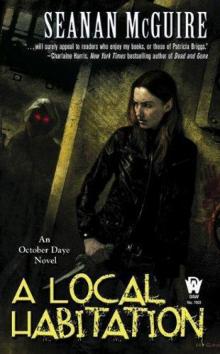 A Local Habitation
A Local Habitation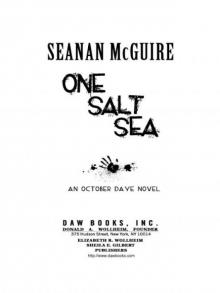 One Salt Sea
One Salt Sea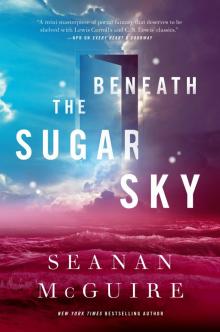 Beneath the Sugar Sky
Beneath the Sugar Sky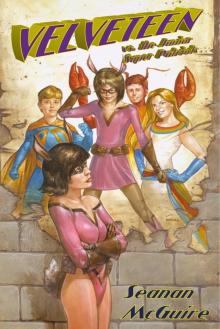 Velveteen vs. The Junior Super Patriots
Velveteen vs. The Junior Super Patriots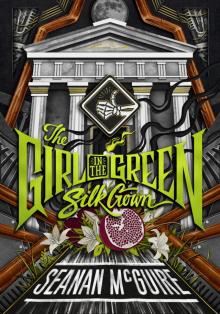 The Girl in the Green Silk Gown
The Girl in the Green Silk Gown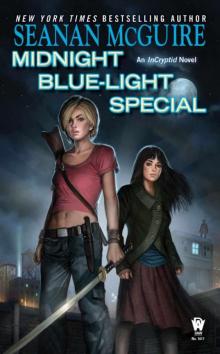 Midnight Blue-Light Special
Midnight Blue-Light Special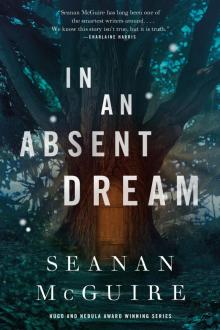 In an Absent Dream
In an Absent Dream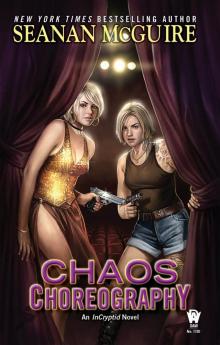 Chaos Choreography
Chaos Choreography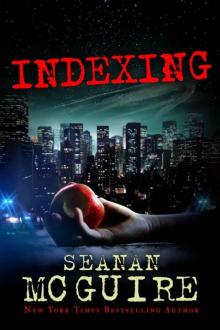 Indexing
Indexing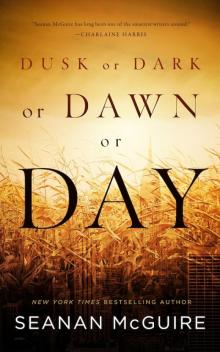 Dusk or Dark or Dawn or Day
Dusk or Dark or Dawn or Day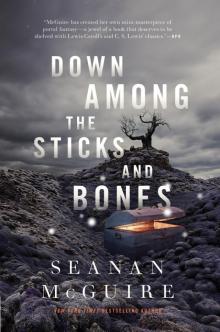 Down Among the Sticks and Bones
Down Among the Sticks and Bones The Razor's Edge
The Razor's Edge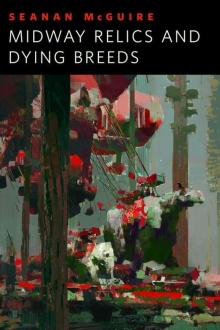 Midway Relics and Dying Breeds
Midway Relics and Dying Breeds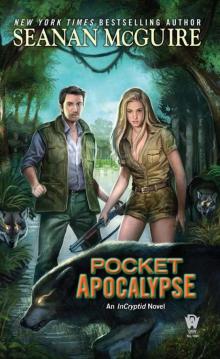 Pocket Apocalypse
Pocket Apocalypse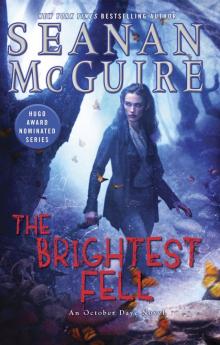 The Brightest Fell
The Brightest Fell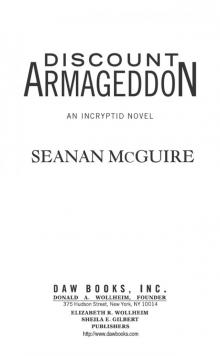 Discount Armageddon
Discount Armageddon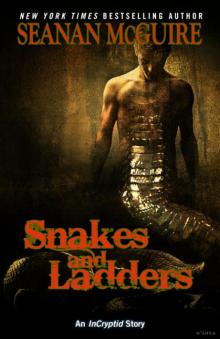 Snakes and Ladders
Snakes and Ladders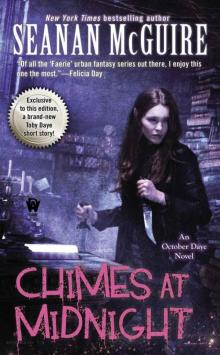 Chimes at Midnight
Chimes at Midnight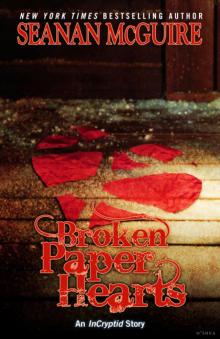 Broken Paper Hearts
Broken Paper Hearts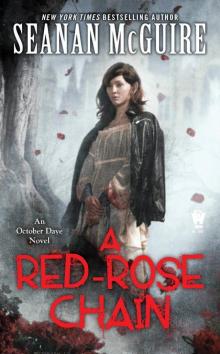 A Red-Rose Chain
A Red-Rose Chain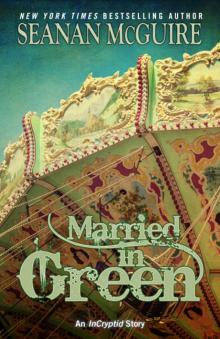 Married in Green
Married in Green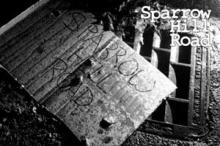 Sparrow Hill Road 2010 By Seanan
Sparrow Hill Road 2010 By Seanan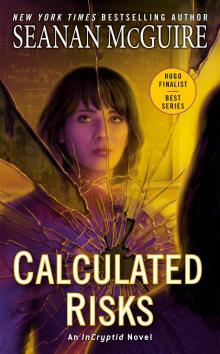 Calculated Risks
Calculated Risks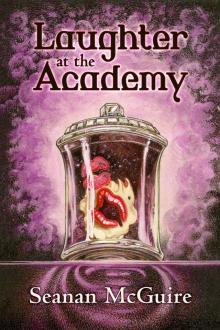 Laughter at the Academy
Laughter at the Academy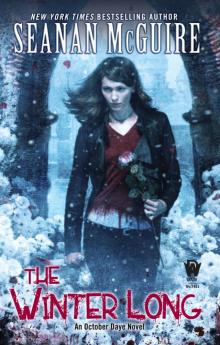 The Winter Long
The Winter Long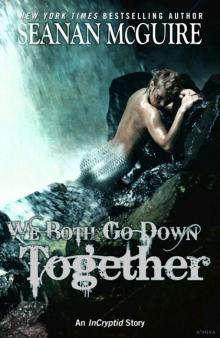 We Both Go Down Together
We Both Go Down Together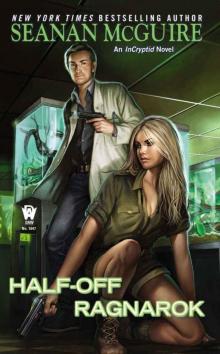 Half-Off Ragnarok
Half-Off Ragnarok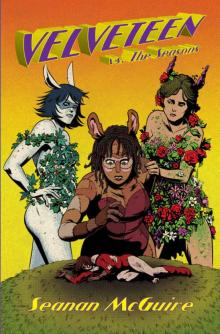 Velveteen vs. The Seasons
Velveteen vs. The Seasons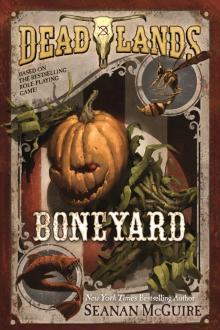 Boneyard
Boneyard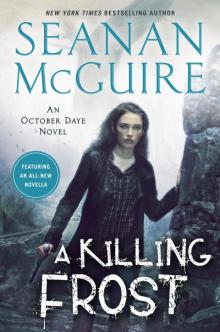 A Killing Frost
A Killing Frost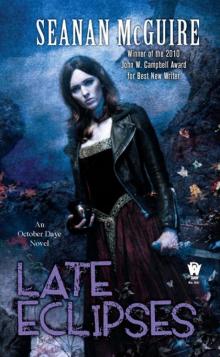 Late Eclipses
Late Eclipses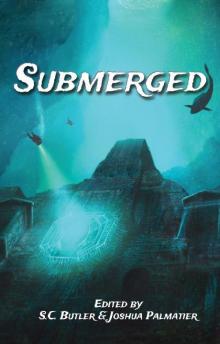 Submerged
Submerged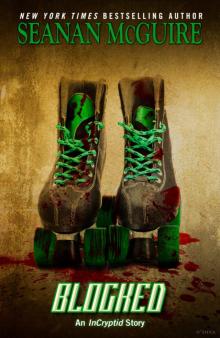 Blocked
Blocked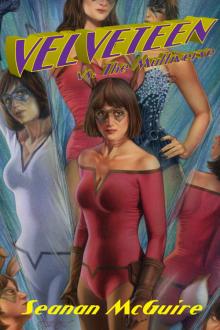 Velveteen vs. The Multiverse
Velveteen vs. The Multiverse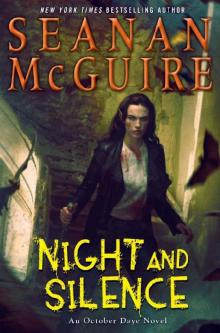 Night and Silence
Night and Silence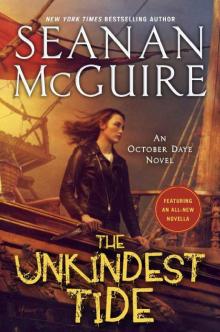 The Unkindest Tide (October Daye)
The Unkindest Tide (October Daye)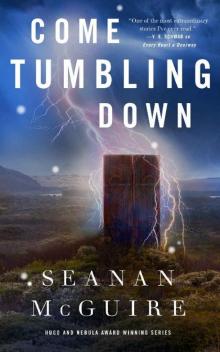 Come Tumbling Down (Wayward Children)
Come Tumbling Down (Wayward Children)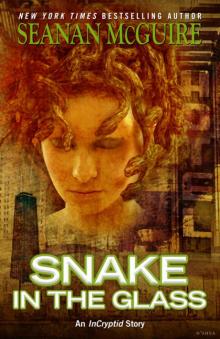 Snake in the Glass
Snake in the Glass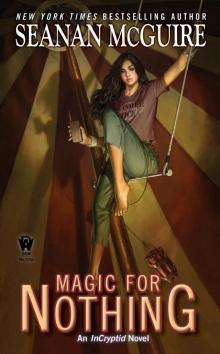 Magic for Nothing
Magic for Nothing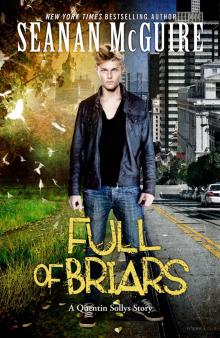 Full of Briars
Full of Briars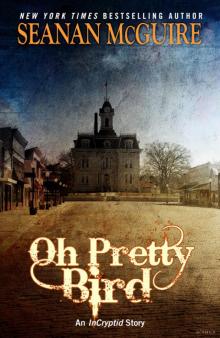 Oh Pretty Bird
Oh Pretty Bird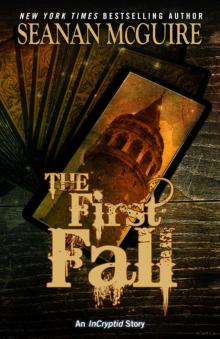 The First Fall
The First Fall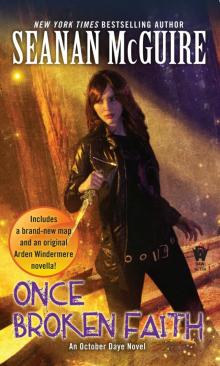 Once Broken Faith
Once Broken Faith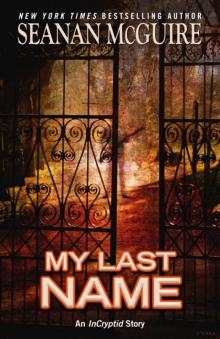 My Last Name
My Last Name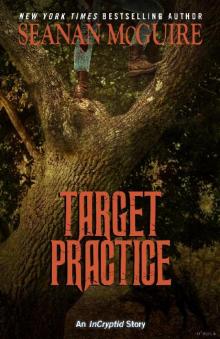 Target Practice
Target Practice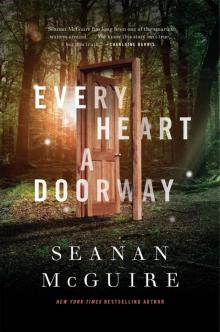 Wayward Children 01 - Every Heart a Doorway
Wayward Children 01 - Every Heart a Doorway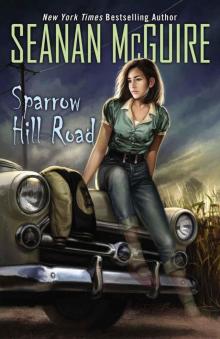 Sparrow Hill Road
Sparrow Hill Road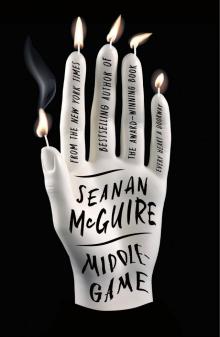 Middlegame
Middlegame Juice Like Wounds
Juice Like Wounds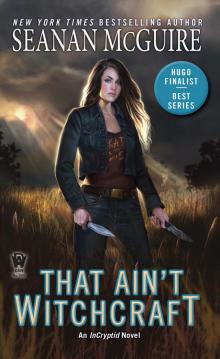 That Ain't Witchcraft
That Ain't Witchcraft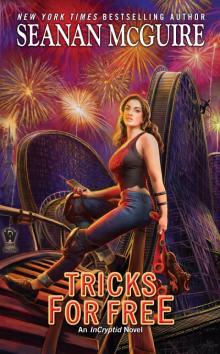 Tricks for Free
Tricks for Free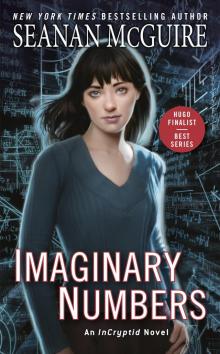 Imaginary Numbers
Imaginary Numbers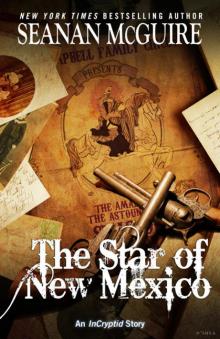 The Star of New Mexico
The Star of New Mexico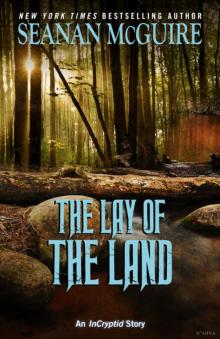 Lay of the Land
Lay of the Land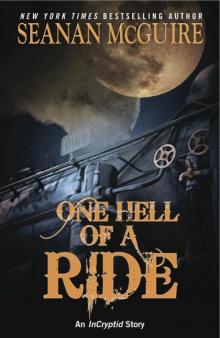 One Hell of a Ride
One Hell of a Ride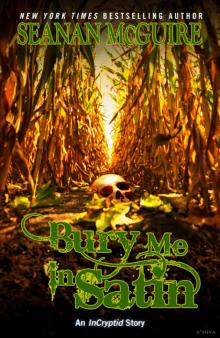 Bury Me in Satin
Bury Me in Satin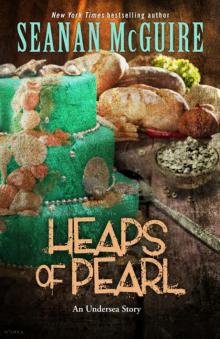 Heaps of Pearl
Heaps of Pearl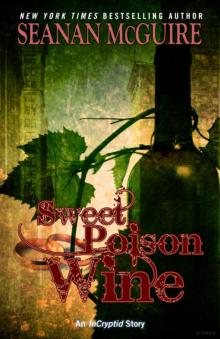 Sweet Poison Wine
Sweet Poison Wine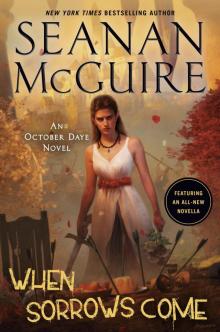 When Sorrows Come
When Sorrows Come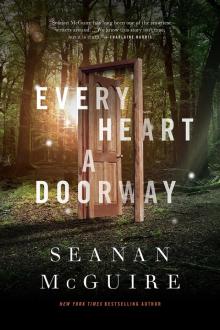 Every Heart a Doorway
Every Heart a Doorway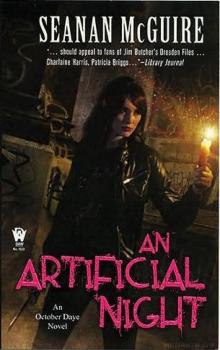 An Artificial Night - BK 3
An Artificial Night - BK 3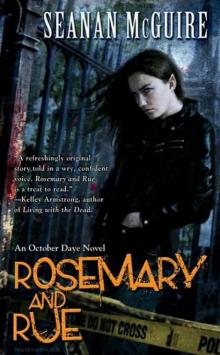 Rosemary and Rue
Rosemary and Rue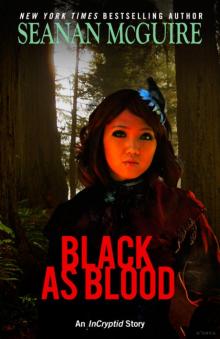 Black as Blood
Black as Blood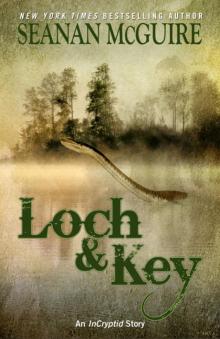 Loch and Key
Loch and Key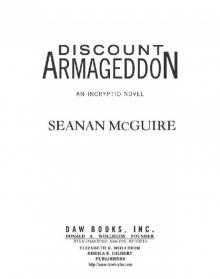 Discount Armageddon: An Incryptid Novel
Discount Armageddon: An Incryptid Novel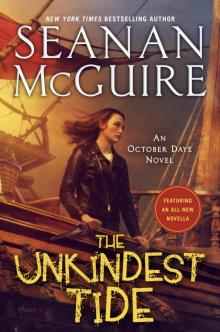 The Unkindest Tide
The Unkindest Tide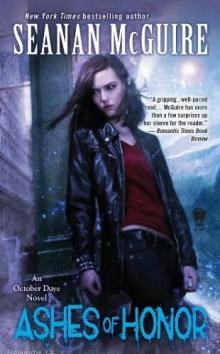 Ashes of Honor od-6
Ashes of Honor od-6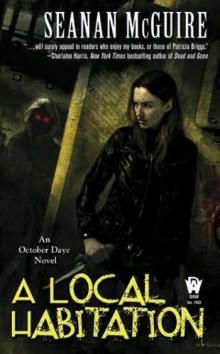 A Local Habitation od-2
A Local Habitation od-2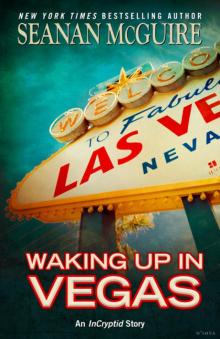 Waking Up in Vegas
Waking Up in Vegas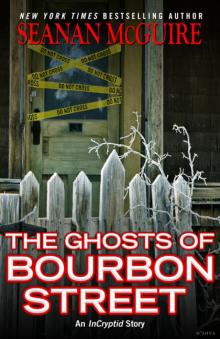 The Ghosts of Bourbon Street
The Ghosts of Bourbon Street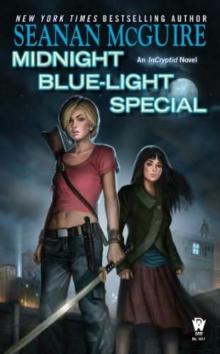 Midnight Blue-Light Special i-2
Midnight Blue-Light Special i-2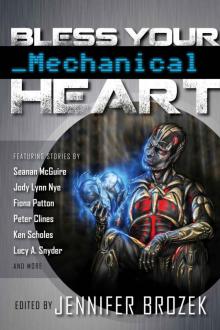 Bless Your Mechanical Heart
Bless Your Mechanical Heart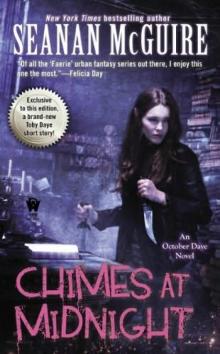 Chimes at Midnight od-7
Chimes at Midnight od-7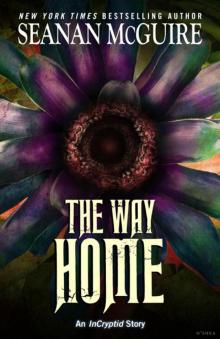 The Way Home
The Way Home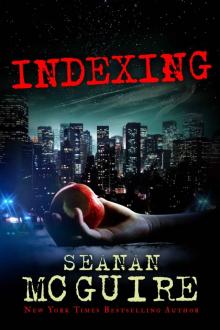 Indexing (Kindle Serial)
Indexing (Kindle Serial)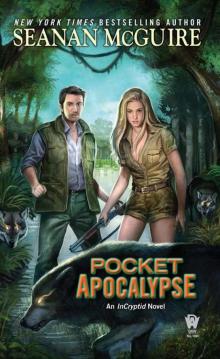 Pocket Apocalypse: InCryptid, Book Four
Pocket Apocalypse: InCryptid, Book Four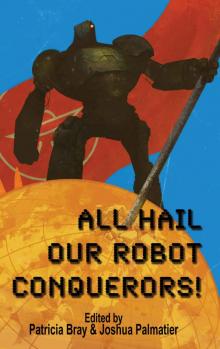 All Hail Our Robot Conquerors!
All Hail Our Robot Conquerors!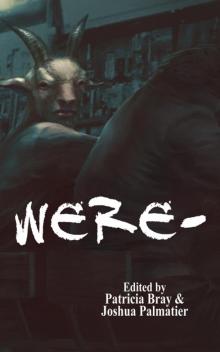 Were-
Were-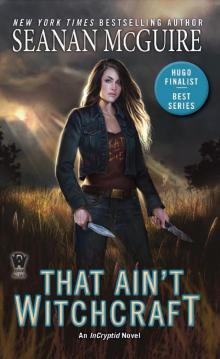 That Ain't Witchcraft (InCryptid #8)
That Ain't Witchcraft (InCryptid #8)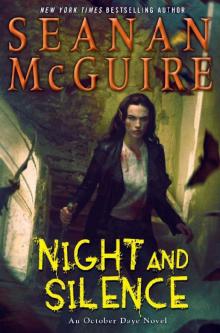 Night and Silence (October Daye)
Night and Silence (October Daye)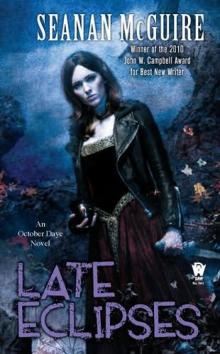 Late Eclipses od-4
Late Eclipses od-4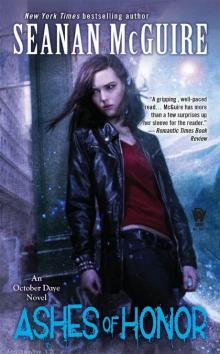 Ashes of Honor: An October Daye Novel
Ashes of Honor: An October Daye Novel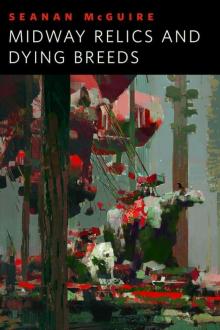 Midway Relics and Dying Breeds: A Tor.Com Original
Midway Relics and Dying Breeds: A Tor.Com Original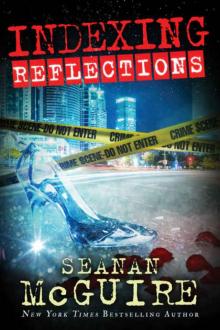 Indexing: Reflections (Kindle Serials) (Indexing Series Book 2)
Indexing: Reflections (Kindle Serials) (Indexing Series Book 2)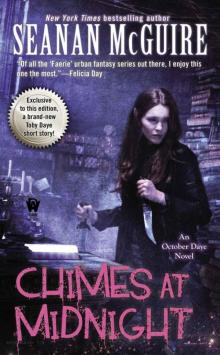 Chimes at Midnight: An October Daye Novel
Chimes at Midnight: An October Daye Novel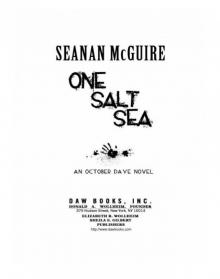 One Salt Sea: An October Daye Novel
One Salt Sea: An October Daye Novel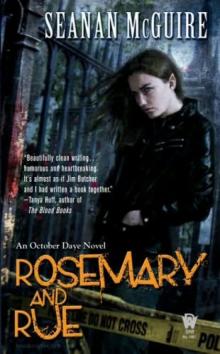 Rosemary and Rue od-1
Rosemary and Rue od-1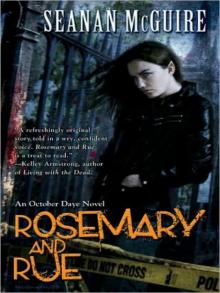 Rosemary and Rue: An October Daye Novel
Rosemary and Rue: An October Daye Novel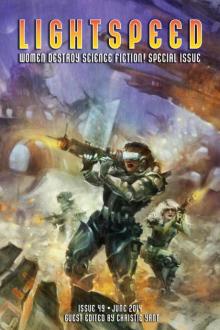 Lightspeed Magazine Issue 49
Lightspeed Magazine Issue 49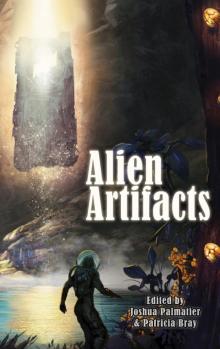 Alien Artifacts
Alien Artifacts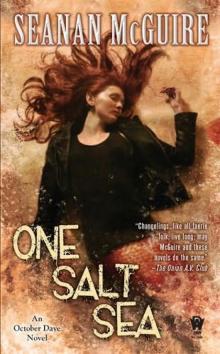 One Salt Sea od-5
One Salt Sea od-5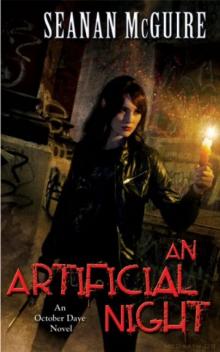 An Artificial Night od-3
An Artificial Night od-3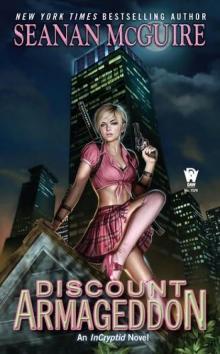 Discount Armageddon i-1
Discount Armageddon i-1